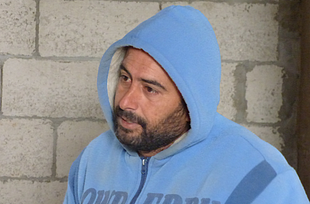Winter weather results in casualties, flooding and Additional displacement in the Gaza Strip
Storm highlights the extreme vulnerability of most of the population
This month Gaza was affected by a winter storm that swept the oPt between 6 to 10 January. The Ministry of Health (MoH) in Gaza reported the death of two infants (aged two and four months of age) from Khan Younis. Another two deaths were reported by the local media, including a fisherman who died while fishing near the shore.[1] Approximately nine people were injured as a result of water tanks falling from rooftops or due to the use of unsafe heating sources or electricity-related incidents.
The heavy rains resulted in localized flooding in low-lying areas of the Gaza Strip, mainly Rafah, Khan Younis and the Middle area, requiring intervention by local service providers to remove water. Water levels in Wadi Gaza remained within the anticipated level, apart from Wadi Al Salqa, where an increase in the water level required intervention by Deir Al Balah municipality to minimize the impact on nearby communities. The Palestinian Civil Defense reported more than 80 rescue missions, primarily for the removal of falling trees and flying objects from main roads, fire-related incidents, and damage to rooftops or the partial collapse of buildings. In addition, more than 50 evacuation missions were carried out by the Palestinian Civil Defense in Rafah and Khan Younis governorates due to flooding or the partial collapse of homes. Affected families were temporarily relocated to the homes of relatives or to UNRWA Collective Centres. A total of 23 families (151 persons) sought shelter in UNRWA Collective Centres during the storm.
Living conditions for IDPs sheltering in pre-fabricated housing units, in damaged houses, or in makeshift shelters were particularly acute during the storm. Leaking was reported in pre-fabricated housing units in Khuza’a (Khan Younis) when plastic sheeting distributed prior to the storm came adrift. Local community committees, volunteers and IDPs cooperated to re-secure plastic sheeting. Recycled gravel made from rubble was spread between pre-fabricated housing units in temporary displacement sites with assistance from local and international organizations to protect IDPs from muddy soil and enable safe movement. The Ministry of Social Affairs (MoSA) and Shelter cluster partners, including national NGOs, distributed NFIs and heaters to affected families.
The ability of service providers to respond has been undermined by chronic problems, including poor infrastructure, old equipment, lack of spare parts, and limited fuel and electricity supply, despite preparedness and coordination efforts in advance of the storm.
Four-month-old girl dies from hypothermia during the winter storm

“Our daughter’s name was Rahet. She was born on 1 November 2014. During the war, Umm Mohammed, my wife, was seven to eight months pregnant. We took shelter in an UNRWA school and during every ceasefire, I would go out to check on the house while my wife stayed in the shelter with our eight children,” Ali said.
It was a neighbour who told Ali that the house had sustained major damage. After the ceasefire, the family returned to live in the home, despite the damage, which included holes in the ceiling caused by air strikes, a number of collapsed walls, and all windows of the house blown out. The family covered the windows with cloth and some plastic sheeting, but during the winter storm, the strong winds blew the covers off the windows and rain poured down through the holes in the ceiling.
“We put wood on the floor and then placed the mattresses on top to try to keep them dry. We collected the water pouring in from the ceiling in containers. One evening, I noticed that Rahet’s skin had changed colour and I became very scared. She had turned blue,” Umm Mohammad recounted.
The Assi family had no electricity in the damaged home and no source of heating. Umm Mohammed called one of her relatives, who drove them to the European Gaza Hospital, where they arrived at 10 pm. They were placed in a freezing cold room in the hospital with no heating while the doctor examined the infant. Rafet refused to breast-feed and, after approximately two hours, she sighed and her heart stopped beating. The doctor succeeded in reviving her and Rahet came back to life for another half an hour before she passed away and was declared dead at 4 am on 9 January. The cause of death was determined to be hypothermia and blocked breathing channels.
“I am disappointed that we do not have access to better health care here in Gaza. Maybe Rahet’s life could have been saved.”
After the funeral, news of the infant’s death spread across Gaza and a local journalist offered to pay the rent for an apartment in a safer location. They have now moved into an apartment in Bani Suheila, but they do not have the name or contact details of the journalist who promised to support them, and who has not yet paid the rent.
Latest Developments
Another storm struck the oPt on the evening of 19 February, with no major impact on the Gaza Strip. The limited impact is attributed to the preparedness of the local authorities and institutions, with support from the private sector and the international community, including the activation of Emergency Operation Centres and the deployment of heavy equipment.
[1] OCHA does systematically not monitor non-conflict related casualties and fatalities in the oPt. The figures on deaths as a result of the winter storm are based solely on the figures reported by MoH and local media reports.









